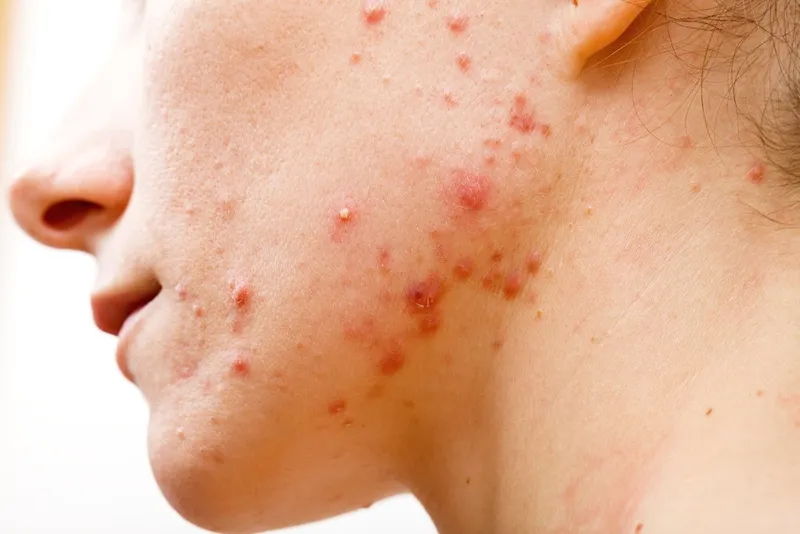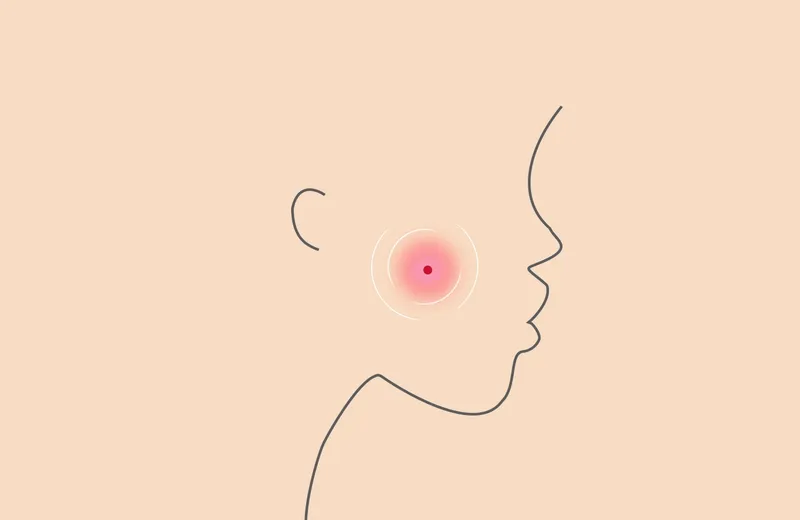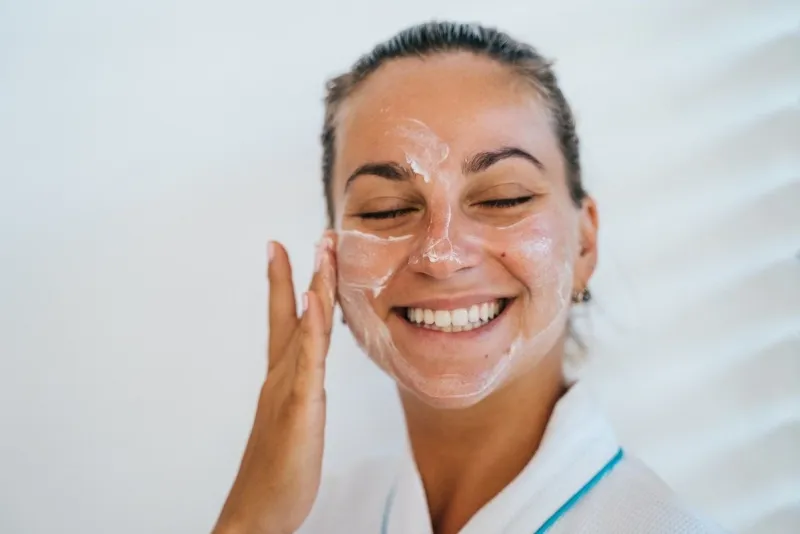When you’re going through your morning skincare routine, do you ever consider skipping the SPF? If you’re suffering from an acne breakout, it may cross your mind. Many people believe that sunscreen can be a pore clogging product that aggravates acne already on the skin. But without sunscreen, how can you protect your healthy skin from too much sun exposure and its damaging UV rays?
What if we told you that a physical sunscreen could actually help in your battle against acne?
Learn everything you need to know about acne and sunscreen’s effect on acne to answer the question, “Does sunscreen help acne?”

Your best skin—in 3 simple steps.
Our award-winning AI technology turns millions of scientific data points into a personalized, clinically effective, 3-step regimen that works—for you.
Acne: A Brief Guide
So, does sunscreen help acne-prone skin?
In the long-term, yes. Sunscreen helps deflect harmful UV rays so your face doesn’t get hot and irritated, which can trigger acne flare ups. It’s also linked to reducing fine lines and wrinkles, age spots, and uneven skin tone. While it is possible for sunscreen to help acne, it’s beneficial to have a deeper understanding of what acne is before diving into the juicy details of this question.
Acne is an inflammatory skin condition that affects approximately 50 million people annually [1]. So if you’ve found yourself with a recent flare-up, you’re certainly not alone. Acne face maps can be helpful to find the root cause of your breakouts, depending on where it shows up on your face.
If you have oily skin, you may be more prone to acne breakouts. Simply put, acne occurs when your hair follicles become clogged with dead skin cells and sebum [2], an oil your body produces to moisturize your skin. Sometimes, your body makes too much sebum, which contributes to clogged follicles. Our personalized gentle facial cleanser creates a custom formula based on your skin type and concern so you can enjoy clear, radiant skin.
When your follicles become blocked, various forms of acne can develop, including [3]:
- Comedones – There are two forms of comedogenic acne: blackheads and whiteheads. They’re considered to be non-inflammatory forms of acne, meaning they don’t often cause inflammation and redness to your skin. Whiteheads are closed pore comedones and appear as small white blemishes, whereas blackheads are open pore comedones and look like little black specks embedded in your skin.
- Pustules – Also known as your middle school adversary, The Pimple, pustules are an inflammatory form of acne that contain a pus-filled center that appears white or yellow in appearance [4].
- Papules – Papules are inflamed red bumps similar to pustules except they don’t contain any pus in the center, and they’re often sensitive to the touch [5].
- Nodules and cysts – Both of these are severe forms of acne that leave large painful lumps under the skin. The biggest difference between the two is that cysts are filled with pus and nodules contain a hard mass [6].
What is Sunscreen Used For in Skincare?
Sunscreen is an essential sun protection tool for your skin, limiting the effect of environmental aggressors like the sun’s ultraviolet rays. It can also help protect your skin barrier, one of the most important organs in your body. While a daily SPF can certainly help prevent painful sunburns and skin damage, it can also offer other benefits too, like [7]:
- Reduced likelihood of skin cancer – UV rays go hand in hand with free radicals, tiny molecules that harm your body by damaging your cells’ DNA [8]. When your body absorbs UV rays, it also absorbs free radicals—and if these free radicals cause your cells enough damage, they can likewise cause skin cancer.
- Protection against premature aging – Have you ever noticed dark spots on an elderly family member’s hands? How about extensive fine lines and wrinkles on their face? Oftentimes, those wrinkles and dark spots are caused by repeated, unprotected exposure to the sun. Of course, we all show signs of aging as the years pass, but with sunscreen, you’re more likely to retain youthful, glowing skin for longer.
Does Sunscreen Help Acne?
The answer to the question, “does sunscreen help acne?” depends in large part on the specific ingredients that are in your sunscreen. For instance, if you’re using a sunscreen that contains non-comedogenic ingredients (ingredients that are less likely to clog your pores), then your acne stands a solid chance of being unaffected.
Of course, sometimes the idea of skipping sunscreen in lieu of a sunkissed tan is hard to resist. With a more bronzed complexion, it’s easy to feel like your acne is hidden or less noticeable. That’s because the darker shade blends with the inflamed red or pink hues associated with your acne. While some people may feel like their acne improves when they go in the sun, it is important to note that the long term effects of the sun on the skin can worsen breakouts and blemishes.
However, when your tan fades away, you might be left dealing with the residual effects of ditching your sunscreen, like:
- An increase in oil production – When you get a sunburn, your skin barrier (the outer layer of your skin) may lose moisture and dry out. When this happens, your skin may compensate for the loss of moisture by producing excess sebum to moisturize your skin [9]. Since sebum can be a pore-blocking instigator, this could trigger a new acne flare-up or aggravate the one you currently have.
- More breakouts – UV rays can exacerbate inflammation, and without sunscreen, you have no protection against the sun’s rays. To that end, a sunburn could increase inflammation and cause a breakout or make your current breakout worse.
When you do apply a non-comedogenic sunscreen (a sunscreen that’s lightweight and non-greasy), you might notice both short- and long-term benefits for your acne. In fact, using a non-comedogenic sunscreen may:
- Help prevent scarring – As your acne begins to heal, you could notice some discoloration where the acne once was. This can turn into hyperpigmentation (dark spots) or acne scars [10]. Exposure to the sun can darken the shade of your scars, making them more noticeable. However, with the proper application of SPF, you may be less likely to notice further scarring [11]. If you’re in the middle of an acne treatment, sunscreen may also help prevent new scars from forming.
- Keep your skin moisturized – When your skin is moisturized, it’s less likely to produce excess sebum [12]. And when it comes to pore-clogging oils vs non-clogging oils, your skin would probably be much happier to become buds with the non-clogging ones in your sunscreen. Hyaluronic acid is a moisturizing ingredient that doesn’t clog pores, making it the ideal ingredient in sunscreen.
Reduce inflammation – Zinc oxide is one of the main active ingredients in sunscreen, and it’s been linked as a potential anti-inflammatory ingredient for skin conditions like acne, rosacea, and eczema [13]. Some sunscreens may also contain ingredients like niacinamide which can help to reduce inflammation and redness.

Your best skin—in 3 simple steps.
Our award-winning AI technology turns millions of scientific data points into a personalized, clinically effective, 3-step regimen that works—for you.
Tips for Using Sunscreen to Fight Acne
To feel confident with your sunscreen application, especially if you’re dealing with acne, you should choose a sunscreen that’s tailored to your skin’s needs. Fortunately, PROVEN Skincare offers a daily moisturizer with SPF that’s specifically tailored to your unique skin profile.
Here are some other tips to consider when choosing a sunscreen when you have acne:
Find a Broad Spectrum SPF
- UVA – UVA rays penetrate deep into your skin (think: free radicals) and damage your cells. They can result in signs of premature aging, like fine lines and wrinkles [14].
- UVB – UVB rays are usually the cause of those unwanted sunburns you got as a kid when your parents forgot to reapply your sunscreen. Because UVB rays penetrate the surface of your skin, they’re more likely to cause skin cancer than UVA rays [15].
To protect yourself against both types of UV rays, it’s crucial to use a broad spectrum SPF, as it works “broadly” to reflect both types of UV rays away from your body. A broad-spectrum sunscreen is one that’s been approved by the FDA (and will be labeled accordingly) [16].
Determine the Right Combination of Ingredients for Your Skin
Some of the acne-fighting ingredients that may be added to your personalized products include:
- Jojoba oil – Jojoba oil is non-comedogenic, so it’s less likely to cause clogged pores. It’s also known for its antioxidant properties [17], which may help protect your skin from free radicals caused by UV rays.
- Tea tree oil – With its antimicrobial properties, tea tree oil can help get rid of the acne-causing bacteria on your face [18].
- Sulfur – Sulfur is a gentle ingredient ideal for sensitive skin that can aid in drying out excess oil on the skin. It also has antimicrobial properties that may help diminish breakouts of mild forms of acne [19] and prevent future flare-ups.
- Vitamin C – When used in conjunction with your sunscreen, vitamin C may further protect your skin against premature aging associated with UV rays [20]. It can also lighten hyperpigmentation or scarring caused by acne or sun damage [23].
- Salicylic acid – This natural exfoliant is ideal for acne-prone skin. It rids your skin of dead skin cells while also helping to unclog follicles so that your skin can begin to heal [22].
Discover Your Custom Daily Sunscreen with PROVEN Skincare
Wearing a daily sunscreen is crucial for protecting your skin from the sun’s UV rays and their potentially damaging effects, like premature aging and skin cancer. And, when you have a personalized SPF that contains the exact ingredients your skin needs, you can also protect your skin from acne and its damaging effects.
And PROVEN makes that simple.
That’s because we’ve developed a 3-minute Skin Genome Quiz that helps us formulate the most effective 3-step system for your unique skin based on factors like your skin profile, your environment, and your skin concerns. From your customized cleanser and daily moisturizer (with SPF) to your night cream, each product will contain beneficial ingredients to help you achieve the skin you’ve always dreamed of.
Take our skin quiz today to start your journey toward healthy, protected, and radiant skin.










